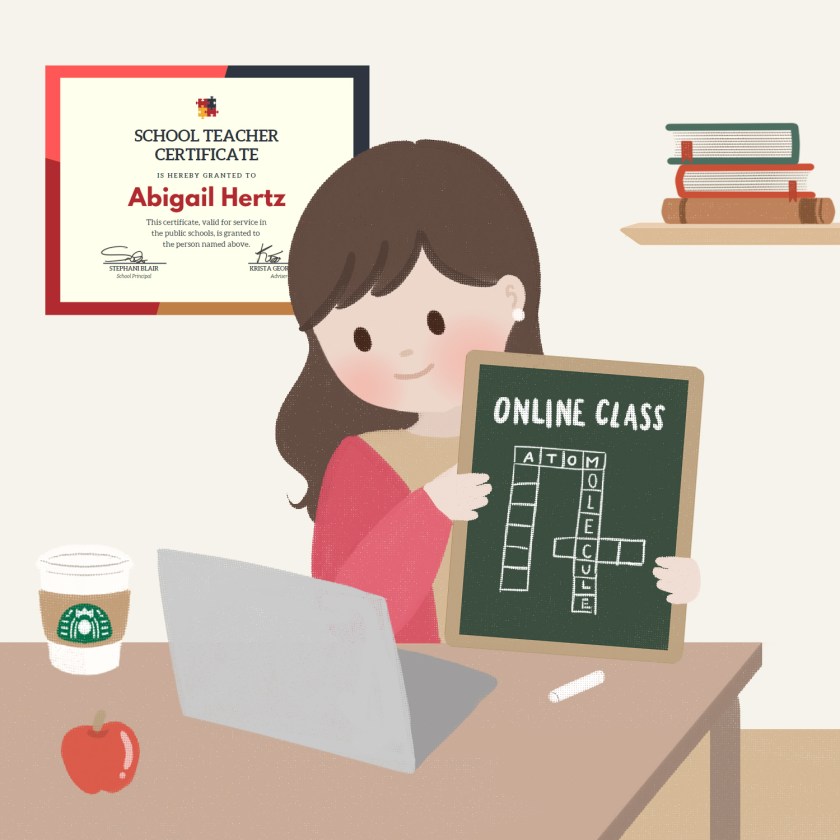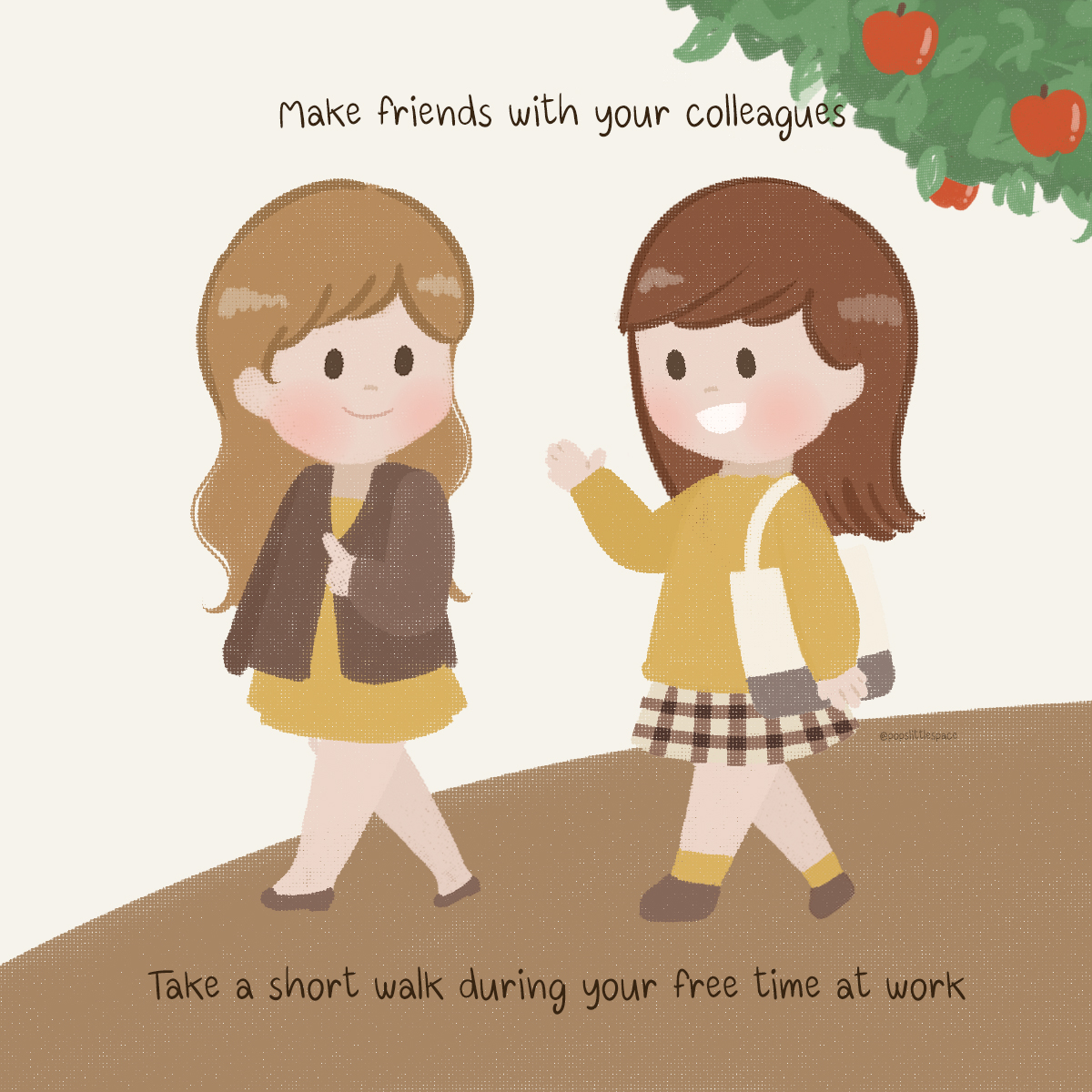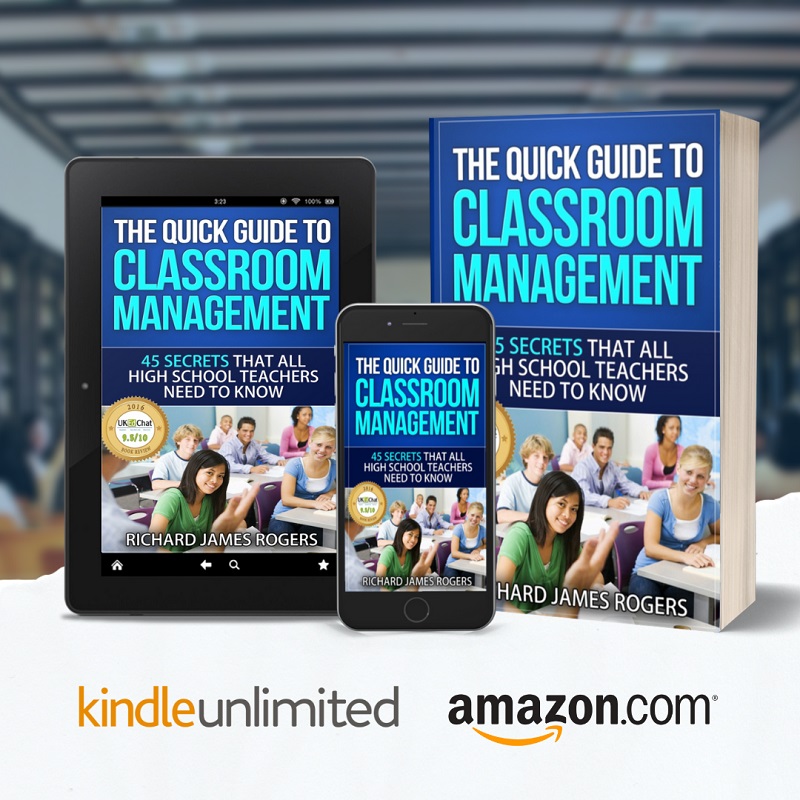An article by Richard James Rogers (Award-winning author of The Quick Guide to Classroom Management). Illustrated by Pop Sutthiya Lertyongphati.
The bell rang at 12.30pm to the typical sigh of relief from students who’d been sat in lessons all morning. Bustling through the corridors towards the school canteen, library, school field or some other designated ‘turf’ were the majority of my classmates at St. Richard Gwyn R.C. High School. I, on the other hand, had an appointment with my favorite teacher.
It felt like an easy journey to the German classroom. I was excited because I would be practicing my German oral phrases and responses with my teacher, who had been giving up a good portion of her lunchtimes for the past few weeks to help me become more confident and competent. She was always patient, and always willing to help.

Then, there was that time when my Biology teacher talked me through an end-of-unit test I had completed, so that I could know exactly where I had lost marks. I still remember the conversation word-for-word, almost thirty years later. I finally grasped some important concepts that day.
At the core of my good fortune to attend an outstanding school as a teenager was one most important thing: outstanding teachers. All of my teachers really cared for my wellbeing, and they often went above-and-beyond to provide me with extra tuition, or even to have one-on-one conversations with me to put me on-track, or to reprimand me when I had slipped up. Great teachers, I found, were more important than great facilities.
There are other factors that make a school outstanding, however. Even the best efforts of a team of outstanding teachers can be thwarted by the subterfuge of negligence, bad policies or even school culture. In this blog post, I will explore all of the key factors that work together to make a school outstanding.
#1: The school’s vision and mission are the starting points
A well-crafted mission statement that infuses everything the school does as a community can have a massive and profound impact on students’ lives.

At Saint Richard Gwyn, for example, our slogan was “Learning Together In Christ“. This phrase was spoken at every assembly, written in many school publications (such as the school’s weekly newsletter) and was reinforced by teachers during some of our lessons. I don’t think I and my peers fully realized the power of this collective action by the school back then, but that statement was actually having a dramatic effect on the way we saw the world, and ourselves. Whether you are religious or not, you can appreciate that this statement sent home a bigger message than just those four words:
- At our school we learn together. Our focus is serious, and we help each other.
- We have faith in Christ at our school. We are expected to follow the moral principles outlined in the gospels.
America’s Center for School Change has the following to say about a school’s Vision and Mission:
Developing the school’s vision and mission are two of the most important steps toward creating a successful program. Done well, they give clarity and direction for a school. A muddy vision or mission can help lead to continuing conflicts, and a school that has difficulty identifying priorities.
Center for School Change
I like that last part about “identifying priorities”. What does your school’s vision and mission and say about your institution’s priorities, and how well-embedded are those priorities?
Over the years, many educational scholars have stressed the importance of the school’s vision and mission, and how well those ideas are communicated and transformed into expectations. A classic amongst these scholars is William Rutherford of the University of Texas who, as far back as 1985, stated that effective school leaders need to:
- have clear, informed visions of what they want their schools to become; visions that focus on students and their needs
- translate these visions into goals for their schools and expectations for their teachers, students and administrators

So it would seem that simply having a vision and mission for a school is not enough to make a school truly outstanding. That vision and mission must focus on students and their needs, be translated into workable goals and be formulated as expectations for teachers, students and all staff members.
#2: Outstanding teachers make an outstanding school
A school’s best resource, by far, is the body of staff that comprise that school. Get that right and a school will usually be able to cope with the ebb and flow of daily circumstance in an effective manner. However, still to this day, schools are focusing far too much on teachers’ qualifications rather than experience, references and reputations, in my opinion.
This is the point where I’m going to have to speak bluntly and directly: an advanced degree does not make someone an amazing teacher; nor does a degree or qualification from a top university. Those credentials, actually, are meaningless in the context of determining one’s ability to manage behaviour, plan lessons thoroughly, teach with clarity and teach at an appropriate pace. Those qualifications may, however, allow a school to better market itself to parents and potential clients/customers (particularly in the private sector), but those qualifications never, in my honest opinion, determine a person’s ability to teach properly.

Teaching is a vocation: plain and simple. It’s a profession that one has to be built for, and one has to be passionate about in order to succeed. Experience has taught me that qualifications alone are not enough to determine a teacher’s suitability to teach. I, for example, have worked with a number of Oxford, Cambridge and PhD graduates over the years who were awful teachers who couldn’t communicate effectively with students and, in a significant number of cases, couldn’t teach at an acceptable pace or keep students engaged for long periods of time. On the other hand, I’ve also worked many such high-level graduates who were excellent teachers and helpful team-players.
Have you experienced the same in your time as a teacher?
My message for schools is simple: Focus on what the students and colleagues think of the teacher you’re hiring. Place more emphasis on teacher-portfolios and references – evidence of actual teaching ability – rather than the quality of a candidate’s qualifications.
#3: Effective systems make a school outstanding
Systems are like the glue that holds everything together. When a school has a clear vision and mission that’s backed-up by outstanding teachers and effective systems, everything then falls into place and runs smoothly (most of the time).
The most essential systems that schools need to have in-place can be remembered by what I hope is a useful acronym: C.A.R.S. – Communication, Action, Rewards and Sanctions.
- Communication systems need to be easy to use, and suitable for purpose. Schools that use the same system to communicate with parents, students, teachers and other stakeholders tend to experience better overall harmony than those that do not. Many schools, for example, choose to use e-mail for these purposes as it is a professional system that everyone can access. However, some schools (e.g. those in China) prefer to use a more real-time system for staff (e.g. chat apps like QQ and WeChat) and more traditional systems, like e-mail, for communicating with parents. Systems like this can cause undue stress to teachers, however, as it can be easy to miss messages posted within a chat stream. Teachers can also feel under constant pressure to respond, even outside of official working hours.
- Action systems need to be workable. Teachers need to do things every day in a timely manner. Printing and photocopying, for example, should never be problematic (massive headaches are caused when printers don’t work, or when teachers are restricted to quotas, for example). Reports need to written via systems that are shared, and easy to navigate and access. Mock exams and internal exams need to be delivered via systems that make it easy for everyone to get their papers printed and organized in a timely manner. Timetabling needs to be seamless. Student locker systems need to be accessible and workable. The role of the form tutor/homeroom teacher within the school, and the systems needed to fulfill that role, need to be easy-to-use (a house system can often help with this). Registration systems need to be workable. Assessment systems and instructional software need to be carefully chosen and subscriptions need to be renewed on-time. File-sharing systems need to be in-place so that teachers can share useful resources with one-another.

Which action systems do you use in your school, and how could they be made to be more workable and accessible?
- Rewards and sanctions systems – with emphasis placed more on rewards than sanctions. The consensus on the approach that should be taken is pretty clear in educational circles, and has been for some time. The UK’s Department for Education and Skills summarizes the key components of such systems best in my opinion:
Rewards, or positive consequences, are likely to encourage pupils to repeat the associated behaviour. Systems that emphasise praise for positive behaviour or regular attendance are more effective in motivating pupils to make appropriate choices. These appropriate choices contribute to a positive ethos in the school, thereby creating an environment for effective teaching and learning. . . . [S]anctions might be used only as a last resort, because using every opportunity to reinforce positive behaviour will have a greater and longer lasting effect than the constant use of sanctions for negative behaviour.
UK Department for Education and Skills, “Behaviour and Attendance Strand. Toolkit Unit 2. Key Stage 3 National Strategy. Everyday Policies: Rewards, Sanctions and Promotion of Positive Behaviour.” pp. 21. [Online] Available at: https://dera.ioe.ac.uk/5708/1/6c37a9499c7e75eaa76fd736c63ca731.pdf
In fact, it’s been known for some time that rewards work better than sanctions for promoting positive behaviour. The most notable foundational statement on this matter, for example, was made in the concluding text of The Elton Report (1989):
Schools which put too much faith in punishments to deter bad behaviour are likely to be disappointed
GREAT BRITAIN, & ELTON, R. (1989). Discipline in schools: report of the Committee of Enquiry chaired by Lord Elton. London, H.M.S.O. Available at http://www.educationengland.org.uk/documents/elton/elton1989.html
Conclusion
Outstanding schools always have the following elements in place:
- A clear vision and mission that’s student-centered and easily translates into goals and expectations for students, teachers and all stakeholders
- Outstanding teachers, with a proven track record of excellence in teaching (not necessarily academic excellence)
- Effective communication, action, rewards and sanctions systems
Bibliography and references (in order of appearance)
W.L. Rutherford. School principals as effective leaders. Phi Delta Kappan, Vol. 67 number1, 1985, pp. 31-34
UK Department for Education and Skills. Behaviour and Attendance Strand. Toolkit Unit 2. Key Stage 3 National Strategy. Everyday Policies: Rewards, Sanctions and Promotion of Positive Behaviour. pp. 21. [Online] Available at: https://dera.ioe.ac.uk/5708/1/6c37a9499c7e75eaa76fd736c63ca731.pdf
GREAT BRITAIN, & ELTON, R. (1989). Discipline in schools: report of the Committee of Enquiry chaired by Lord Elton. London, H.M.S.O. Available at http://www.educationengland.org.uk/documents/elton/elton1989.html























































